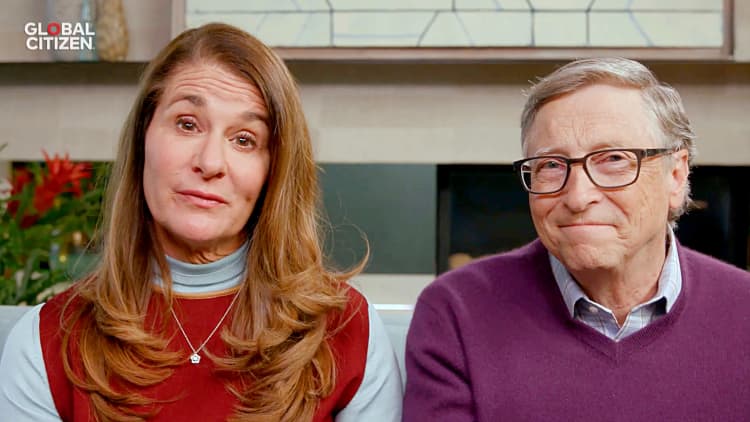
Scientists and health officials may find a vaccine that is effective in preventing Covid-19 by the end of this year "if we're lucky," billionaire philanthropist and former tech executive Melinda Gates told CNBC on Tuesday.
Producing a usable vaccine is a long process that requires extensive study of viable vaccine candidates, Gates told CNBC's Sara Eisen during an interview that aired on "Closing Bell."
"Then to make sure, okay, when we put it in our bodies, it's not gonna create more harm," said Gates, co-chair of the Bill and Melinda Gates Foundation, which has donated $100 million to coronavirus vaccine and treatment efforts. "So yes, we may get one of those candidates if we're lucky by the end of the year."
Even if scientists do find a vaccine in record time, they would still need to make millions and eventually billions of doses of the vaccine for the general public, Gates said. There are more than 7.6 billion people in the world, and some of the vaccines under development require more than one dose.
"We have never, never as a globe made a vaccine of this type before nor of this scale before ever. So this is not a quick nor swift process," she said.
There are no proven treatments for Covid-19, and U.S. health officials have repeatedly said producing a vaccine will take a year to 18 months at the earliest. More than 100 vaccines are in development globally as of April 30, according to the World Health Organization, with at least eight vaccine candidates already in human trials. Global health experts say only a portion of those vaccines are likely to be successful.
Gates' comments come hours after White House health advisor Dr. Anthony Fauci told members of Congress that he is optimistic scientists will be able to find a workable vaccine candidate but also warned that "there's no guarantee that the vaccine is actually going to be effective."
"You can have everything you think that's in place and you don't induce the kind of immune response that turns out to be protective and durably protective," Fauci said of vaccines during a hearing with the Senate Committee on Health, Education, Labor and Pensions.
He continued, "So one of the big unknowns is, will it be effective? Given the way the body responds to viruses of this type, I'm cautiously optimistic that we will with one of the candidates get an efficacy signal."
Another worry among epidemiologists, Fauci said, is that the vaccine backfires and strengthens the virus.
There have been at least two vaccines in the past that have produced a "suboptimal response," he said. "And when the person gets exposed, they actually have an enhanced pathogenesis of the disease, which is always worrisome. So we want to make sure that that doesn't happen. Those are the two major unknowns."
Gates said she is following "closely" advancements from Moderna, Johnson & Johnson and Oxford University, which are each producing a potential vaccine to fight the coronavirus. The virus has infected more than 1.3 million people in the United States, according to data compiled by Johns Hopkins University.
Last month, researchers from Oxford said they are hopeful a vaccine will be available by September, even before trials prove it is successful.
"There are some good signs of light and hope," Gates said. "But we all have to remember as Americans, there is, you know, this is a process."
Read CNBC's live updates to see the latest news on the Covid-19 outbreak.


